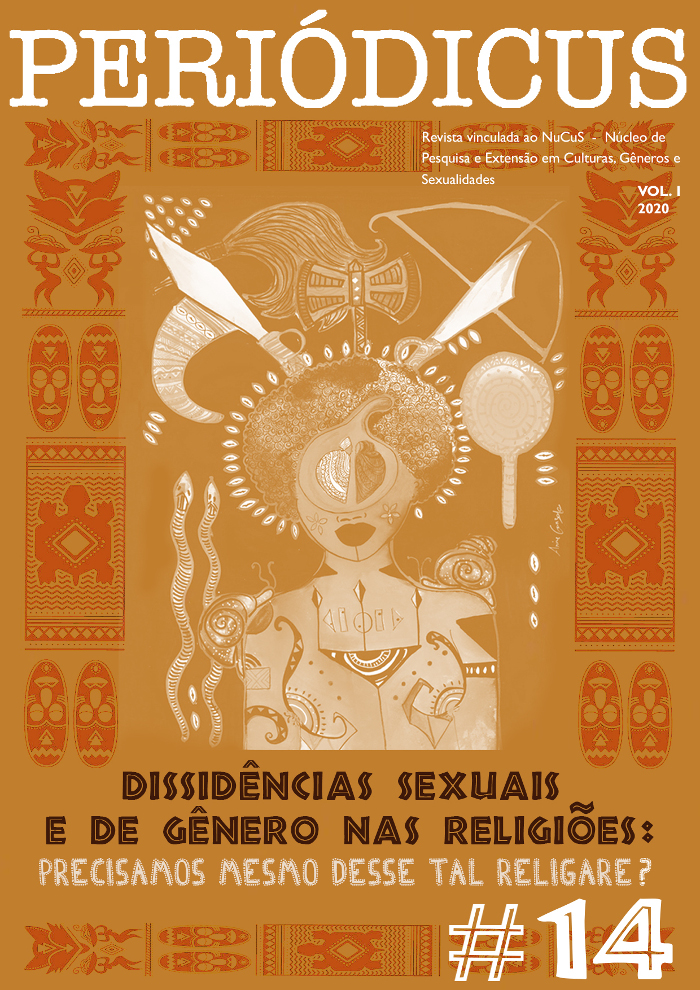“A mão que afaga é a mesma que apedreja” - análise discursiva sobre amor materno, religião e sexualidade.
DOI:
https://doi.org/10.9771/peri.v1i14.37096Resumo
Resumo: Com base na Análise de Discurso de Linha Francesa, o presente artigo discute a violência contra a população LGBTQI+ relacionando-a ao discurso religioso. Para isso, traz, como corpus de análise, o discurso da Cantora Gospel Eyshila, postado em seu Instagram para se posicionar sobre a sexualidade do filho que, antes evangélico como seus pais, declarou-se homossexual e Drag. A partir da observação sobre o discurso, a análise se utilizou, principalmente, de conceitos discursivos relacionados à ideologia, a formações discursivas e a efeito de sentido, com a finalidade de, a partir de um gesto de leitura, interpretar seu funcionamento. Objetivou-se ainda observar como Eyshila discursiviza a homossexualidade ao se posicionar como mãe e como mulher evangélica/religiosa que é, a fim de observar se, nesses lugares, ela rompe ou perpetua o discurso de sua formação discursiva; e, como consequência disso, objetivou-se também verificar se o seu discurso se mostra significativo no combate ao preconceito e à violência. Pêcheux (2014 e 2015), Orlandi (2015), Mussalim (2001) e Barbosa e Silva (2016) foram referências teóricas para esta análise. O estudo mostrou que um aparente discurso de aceitação à homossexualidade pode ter efeitos de sentido carregados de preconceito e incitar a violência contra a população LGBTQI+. A pesquisa refere-se a um gesto de interpretação, que procura atravessar o efeito de transparência do discurso, e que não se esgota nesta análise.
Palavras-chaves: Análise de discurso; discurso materno; preconceito religioso; violência; homossexualidade.
Downloads
Downloads
Publicado
Como Citar
Edição
Seção
Licença
Copyright (c) 2021 LEILA SILVANA PONTES

Este trabalho está licenciado sob uma licença Creative Commons Attribution-NonCommercial 4.0 International License.
Autores que publicam nesta revista concordam com os seguintes termos:
Autores mantêm os direitos autorais e concedem à revista o direito de primeira publicação, com o trabalho simultaneamente licenciado sob Licença Creative Commons Attribution Noncommercial que permite o compartilhamento do trabalho com reconhecimento da autoria e publicação inicial nesta revista, sendo vedado o uso com fins comerciais.
Autores têm autorização para assumir contratos adicionais separadamente, para distribuição não-exclusiva da versão do trabalho publicada nesta revista (ex.: publicar em repositório institucional ou como capítulo de livro), com reconhecimento de autoria e publicação inicial nesta revista.
Autores têm permissão e são estimulados a publicar e distribuir seu trabalho online (ex.: em repositórios institucionais ou na sua página pessoal) a qualquer ponto antes ou durante o processo editorial, já que isso pode gerar alterações produtivas, bem como aumentar o impacto e a citação do trabalho publicado (Veja O Efeito do Acesso Livre).








